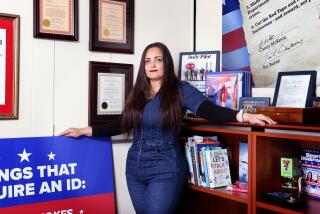‘My dream is that someday every job application will list relevant volunteer experience.’
Even though she has traveled around the world and been party to more than a couple of important events, Ruth March somehow always stays close to the hills of Los Feliz.
“I went to Franklin Elementary, King Junior High and Marshall, and so did my daughters,” she said in a paper-crisp voice. “I was a PTA president. I was with Girl Scouts. Then I got involved in alternative education.”
The daughters have grown and had children of their own. But March still lives in the orbit of those schools, renting a small house on a winding street above Fern Dell.
With Hollywood stretched out beautifully beneath her balcony, March served a cup of tea the other day and talked not so much about herself as about the other thing that has been constant in her life, the career of volunteering.
Over the past 30 years, March has volunteered for almost everything, including three Democratic presidential conventions.
Along the way, she mastered the skills of many a paying job. And for the last 15, she’s calling on them all in a campaign to awaken corporate America to the value of volunteers.
Her first taste of politics came to her when the Democrats brought their 1960 convention to Los Angeles. Naturally, she volunteered.
“I was a Golden Girl,” she said. That was kind of a combination of cheerleader and usherette for the state delegations. “We had great big white hats and white polyester dresses. I had Oklahoma.”
When the excitement of the convention was over, March had no trouble getting back into the more mundane and making it interesting. She volunteered with two innovative educational organizations, one called Education Through Aviation and the other the Work Furlough.
If the pattern in her work had not yet come clear, March didn’t mind. Things didn’t seem to be happening by design.
“I don’t know,” she said apologetically. “Everything just seems to happen.”
In those years, politics became a constant for March, though it never rose to be her metier. She went to the 1968 Democratic convention in Chicago as an alternate delegate and then to Miami in 1972.
All the while, she continued to volunteer in the schools. She helped the Los Angeles Unified School District establish its parent volunteer program, which today places hundreds of parent aides in the classroom.
Somehow, it was becoming clear that the subject of March’s life was volunteerism itself.
Confirmation of that fact came in the early 1970s, when aerospace industry hit bottom and several of March’s friends, who were married to unemployed engineers, tried to find work. Like her, they had spent years as volunteers. But when it came time to fill out job applications, they found no place to write down their experience.
“The only thing they could get was what I call the May Co. basement syndrome,” March said.
From then on, March has been on crusade. She’s lobbied everyone from Mayor Tom Bradley to the corporate heads of America. Her goal is specific and would seem simple enough.
“My dream is that someday every job application will list relevant volunteer experience,” she said.
But, in 15 years, March has found progress painfully slow.
“I had a granddaughter 3 years old when this started, and she’s going to start college in the fall,” March said. “Before it’s over, I think she’ll be getting her Ph.D.”
Early on, she persuaded Bradley to get a line about volunteer experience on job applications for the city of Los Angeles. Bradley also took her case before the national mayors’ convention in 1976. Many other cities have followed.
March is drumming up support for a bill introduced into the House of Representatives last year by Rep. Augustus F. Hawkins (D-Los Angeles). It recognizes the importance of volunteerism and urges companies to allow space for volunteer experience on their job applications.
March has won endorsements for her concept from the United States Chamber of Commerce, the International Personnel Management Assn. and several key corporations such as Wells Fargo Bank, United Airlines and Transamerica.
But success remains elusive.
Last year, March said, the Center for Corporate Public Involvement sent a questionnaire on volunteerism to the nation’s businessmen.
Half the respondents said they encouraged their employees to do volunteer work.
“Only 11% considered volunteer work as related to employment,” she said.
So back to the typewriter she goes.
“I write to corporations and say they should have job descriptions and get objective references,” she said.
Along the way, March has also worked for money a few times, usually to earn extra money for traveling.
She takes time out from the crusade now and then to join a new project. When the 1984 Olympics came to town, she volunteered. Later, the job was given a salary.
March, who lives comfortably--not richly, used the money to take her granddaughter on a trip.
And she learned a secret from the experience: The same job was easier when it was salaried. It seems that everyone understood what it was.
More to Read
Get the L.A. Times Politics newsletter
Deeply reported insights into legislation, politics and policy from Sacramento, Washington and beyond. In your inbox three times per week.
You may occasionally receive promotional content from the Los Angeles Times.











